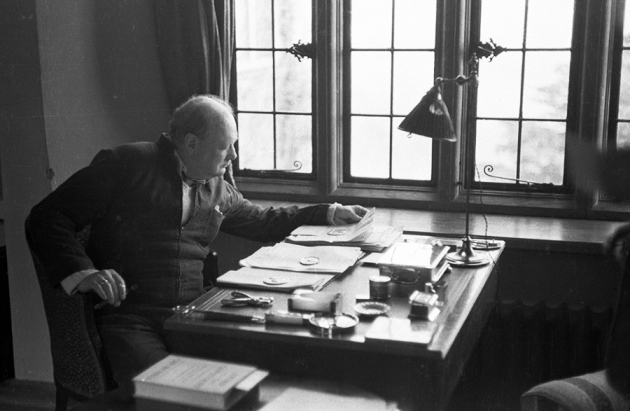Winston Churchill’s essay on alien life found
by Mario Livio
15 February 2017
A newly unearthed article by the great politician reveals that he reasoned like a scientist about the likelihood of extraterrestrials, writes Mario Livio.
Subject terms:
Astronomy and astrophysics History Policy Politics
Kurt Hutton/Picture Post/Getty
Winston Churchill at his desk in 1939: a prolific writer, he covered scientific topics as diverse as evolution and fusion power.
Winston Churchill is best known as a wartime leader, one of the most influential politicians of the twentieth century, a clear-eyed historian and an eloquent orator. He was also passionate about science and technology.
Aged 22, while stationed with the British Army in India in 1896, he read Darwin's On the Origin of Species and a primer on physics. In the 1920s and 1930s, he wrote popular-science essays on topics such as evolution and cells in newspapers and magazines. In a 1931 article in The Strand Magazine entitled 'Fifty Years Hence'1, he described fusion power: “If the hydrogen atoms in a pound of water could be prevailed upon to combine together and form helium, they would suffice to drive a thousand-horsepower engine for a whole year.” His writing was likely to have been informed by conversations with his friend and later adviser, the physicist Frederick Lindemann.
LISTEN
Noah Baker finds out about Winston Churchill’s close relationship with science.
During the Second World War, Churchill supported the development of radar and Britain's nuclear programme. He met regularly with scientists such as Bernard Lovell, the father of radio astronomy. An exchange about the use of statistics to fight German U-boats captures his attitude. Air Chief Marshal Arthur 'Bomber' Harris complained, “Are we fighting this war with weapons or slide rules?” Churchill replied, “Let's try the slide rule.”2
He was the first prime minister to employ a science adviser, hiring Lindemann in the early 1940s. The science-friendly environment that Churchill created in the United Kingdom through government funding of laboratories, telescopes and technology development spawned post-war discoveries and inventions in fields from molecular genetics to X-ray crystallography.
Despite all this, it was a great surprise last year, while I was on a visit to the US National Churchill Museum in Fulton, Missouri, when the director Timothy Riley thrust a typewritten essay by Churchill into my hands. In the 11-page article, 'Are We Alone in the Universe?', he muses presciently about the search for extraterrestrial life.
He penned the first draft, perhaps for London's News of the World Sunday newspaper, in 1939 — when Europe was on the brink of war. He revised it lightly in the late 1950s while staying in the south of France at the villa of his publisher, Emery Reves. For example, he changed the title from 'Are We Alone in Space?' to 'Are We Alone in the Universe?' to reflect changes in scientific understanding and terminology. Wendy Reves, the publisher's wife, passed the manuscript to the US National Churchill Museum archives in the 1980s.
Riley, who became director of the museum in May 2016, has just rediscovered it. To the best of Riley's knowledge, the essay remained in the Reves's private collection and has never been published or subjected to scientific or academic scrutiny. Imagine my thrill that I may be the first scientist to examine this essay.
Here I outline Churchill's thinking. At a time when a number of today's politicians shun science, I find it moving to recall a leader who engaged with it so profoundly.
Modern thinking









